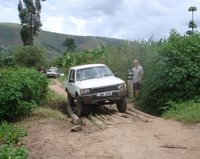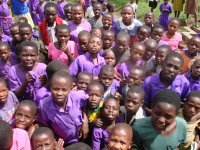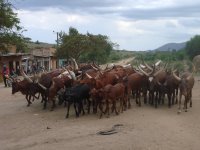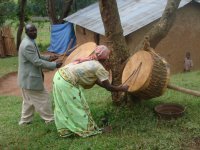Week 2: Rubingo Site Visit
The second week of my tour in Uganda was spent visiting the project site called Rubingo. This is the site of the previous water project that has been ongoing for the last several years and completed last year. Along with the completed water project, ongoing projects include both health education and agriculture projects. The interns involved in these areas stayed at the Rubingo camp while the water crew returned to Mbarara in preparation for our November 1st arrival at Nyakigera. It is worth noting that the last 5 days of every month are taken off so the workers can return home to see there families. This is achieved by working 6 days a week during the rest of the month. Life in Uganda runs at a much slower pace than the western world. Rural life appears to operate even slower. This coupled with the fact that there are effectively 3 people filling one role makes life very easy going and stress-free. The first task has been confirming the sizing (volumes) of all the tanks for the project. When we arrive at Nyakigera tank construction will commence. Trenching and laying pipe is scheduled to commence in January.
Camp life is the equivalent of a tropical version of a western work camp. With stay in large tents which have a protective shelter. Each tent has two beds (with mosquito nets of course) and a shelf. There is a tent set up as the office and there is a building for meals. There is no electricity except for a solar panel connected to a battery that is generally reserved for the laptop and charging cell phones. There are 3 meals a day and variety in the meals is basically non-existent, but the food quite good. Meat is served one a week. Seeing as theres no power, sleep comes quite early and reading by headlamp is abundant.
This Friday is the start of our first 5 day off. Most of us as taking a bus to Kigali, the capital of Rwanda, to spend a few days. I am very much looking forward to this.
Last night me and a couple others had dinner at one of the nicer hotels in Mbarara and after dinner we were joined by 2 lawyers from Kampala. They represented a micro-finance firm and are in Mbarara for court, trying to recover a large sum of money. It was by far the most interesting conversation I have had over here. We mainly discussed the difficulties of financing in Uganda (I think it could be generalized to most of Africa) and the difference in attitude towards money and financing between Africans and westerners. The conclusion was also quite funny and worth noting, as they got into their Mercedes and drove to another hotel because they wanted steak for dinner and this hotel was out. It is the first time I have witnessed first hand the wealth gap that exists here between the majority who can barely afford to eat, and the upper class who control the country.
 A visit to one the widow's gardens. There are 8 such gardens in the Rubingo area. The land in purchased or leased for the widows associations and the widows work the land. This provides food and potentially some extra income.
A visit to one the widow's gardens. There are 8 such gardens in the Rubingo area. The land in purchased or leased for the widows associations and the widows work the land. This provides food and potentially some extra income.
 One of the widows
One of the widows
 A local distilling method. These are very common and are quite often located near the water projects because the distilling requires flowing water. Basically a local 'beer' brewed from bananas is distilled twice in barrels to produce a very strong liquor. Similiar taste to a gin, really burns as it goes down.
A local distilling method. These are very common and are quite often located near the water projects because the distilling requires flowing water. Basically a local 'beer' brewed from bananas is distilled twice in barrels to produce a very strong liquor. Similiar taste to a gin, really burns as it goes down.
 John takes a water sample at one of the tapstands. Every stop we attract large crowds, especially at schools, such as this one.
John takes a water sample at one of the tapstands. Every stop we attract large crowds, especially at schools, such as this one.
 Every drive is an adventure here. We have experienced 5 flat tires so far. This is one of the local bridges.
Every drive is an adventure here. We have experienced 5 flat tires so far. This is one of the local bridges.
 Women carry everything on their heads. This is a relatively small load of bananas.
Women carry everything on their heads. This is a relatively small load of bananas.
 "Beauty lies in these hills"
"Beauty lies in these hills"
 A local child follows us through a banana plantation on a visit to one of the water sources
A local child follows us through a banana plantation on a visit to one of the water sources
 Children swarm when a camera is around. They go crazy when you show them a picture of themselves.
Children swarm when a camera is around. They go crazy when you show them a picture of themselves.
 Some locals at a rainwater catchment facility.
Some locals at a rainwater catchment facility.
 Some kids play in the streets at Kikigati, another project site we visited
Some kids play in the streets at Kikigati, another project site we visited
 Traffic jam in Kikigati
Traffic jam in Kikigati
 Some local kids oversee the changing of a tire
Some local kids oversee the changing of a tire
 Digging up a short section of the pipeline for maintenance.
Digging up a short section of the pipeline for maintenance.
 We are welcomed to the church by these drummers.
We are welcomed to the church by these drummers.

An hiv/aids eductional play following church draws a large crowd

Kids seem to be attracted to the tapstands but they also seem to respect them and I very seldom see the taps open unnecessarily.
Camp life is the equivalent of a tropical version of a western work camp. With stay in large tents which have a protective shelter. Each tent has two beds (with mosquito nets of course) and a shelf. There is a tent set up as the office and there is a building for meals. There is no electricity except for a solar panel connected to a battery that is generally reserved for the laptop and charging cell phones. There are 3 meals a day and variety in the meals is basically non-existent, but the food quite good. Meat is served one a week. Seeing as theres no power, sleep comes quite early and reading by headlamp is abundant.
This Friday is the start of our first 5 day off. Most of us as taking a bus to Kigali, the capital of Rwanda, to spend a few days. I am very much looking forward to this.
Last night me and a couple others had dinner at one of the nicer hotels in Mbarara and after dinner we were joined by 2 lawyers from Kampala. They represented a micro-finance firm and are in Mbarara for court, trying to recover a large sum of money. It was by far the most interesting conversation I have had over here. We mainly discussed the difficulties of financing in Uganda (I think it could be generalized to most of Africa) and the difference in attitude towards money and financing between Africans and westerners. The conclusion was also quite funny and worth noting, as they got into their Mercedes and drove to another hotel because they wanted steak for dinner and this hotel was out. It is the first time I have witnessed first hand the wealth gap that exists here between the majority who can barely afford to eat, and the upper class who control the country.
 A visit to one the widow's gardens. There are 8 such gardens in the Rubingo area. The land in purchased or leased for the widows associations and the widows work the land. This provides food and potentially some extra income.
A visit to one the widow's gardens. There are 8 such gardens in the Rubingo area. The land in purchased or leased for the widows associations and the widows work the land. This provides food and potentially some extra income. One of the widows
One of the widows A local distilling method. These are very common and are quite often located near the water projects because the distilling requires flowing water. Basically a local 'beer' brewed from bananas is distilled twice in barrels to produce a very strong liquor. Similiar taste to a gin, really burns as it goes down.
A local distilling method. These are very common and are quite often located near the water projects because the distilling requires flowing water. Basically a local 'beer' brewed from bananas is distilled twice in barrels to produce a very strong liquor. Similiar taste to a gin, really burns as it goes down. John takes a water sample at one of the tapstands. Every stop we attract large crowds, especially at schools, such as this one.
John takes a water sample at one of the tapstands. Every stop we attract large crowds, especially at schools, such as this one. Every drive is an adventure here. We have experienced 5 flat tires so far. This is one of the local bridges.
Every drive is an adventure here. We have experienced 5 flat tires so far. This is one of the local bridges. Women carry everything on their heads. This is a relatively small load of bananas.
Women carry everything on their heads. This is a relatively small load of bananas. "Beauty lies in these hills"
"Beauty lies in these hills" A local child follows us through a banana plantation on a visit to one of the water sources
A local child follows us through a banana plantation on a visit to one of the water sources Children swarm when a camera is around. They go crazy when you show them a picture of themselves.
Children swarm when a camera is around. They go crazy when you show them a picture of themselves. Some locals at a rainwater catchment facility.
Some locals at a rainwater catchment facility. Some kids play in the streets at Kikigati, another project site we visited
Some kids play in the streets at Kikigati, another project site we visited Traffic jam in Kikigati
Traffic jam in Kikigati Some local kids oversee the changing of a tire
Some local kids oversee the changing of a tire Digging up a short section of the pipeline for maintenance.
Digging up a short section of the pipeline for maintenance. We are welcomed to the church by these drummers.
We are welcomed to the church by these drummers.
An hiv/aids eductional play following church draws a large crowd

Kids seem to be attracted to the tapstands but they also seem to respect them and I very seldom see the taps open unnecessarily.
0 Comments:
Post a Comment
<< Home